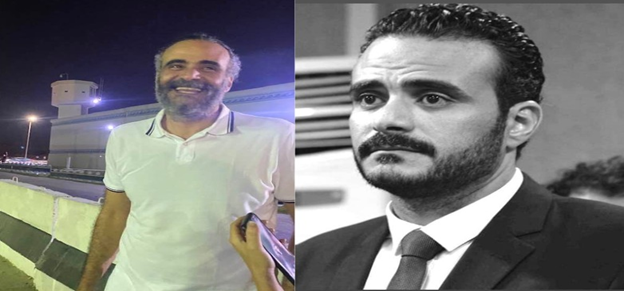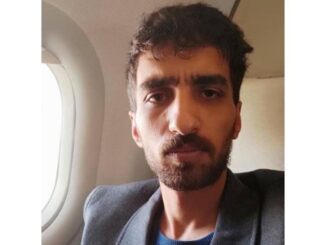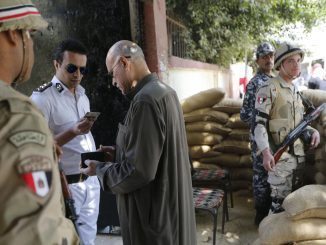
Amr Imam is a human rights defender and lawyer who was arrested at his home in Maadi, Cairo, by the police on 16 October 2019.
Amr’s arrest came after the lawyer announced his intention to start a hunger strike as a sign of protest against the almost daily illegal arrests of human rights defenders and police abuses.
At the time Amr, who witnessed Alaa Abdel Fattah’s arrest, said: “This is a blatant violation against lawyers… lawyers are immune while working, just like judges and prosecutors. As a lawyer, I am afraid about getting arrested right now.”
Amr’s release
In April, a list of pardons and releases was announced on 24 April 2022 after Sisi’s Iftar at the end of Ramadan, in which he announced the restructuring of the pardon committee, which considers political prisoners’ cases.
Although Amr was on this list, he was later removed; he is the only person to be taken off the list—and no explanation has been given as to why.
However, Yasser Imam, Amr Imam’s brother, published a picture with Amr after the decision to release him, Saturday, together with Nasser Salama, Yahya Zakaria Othman Najm, and Mumtaz Fathi Abdel Wahab Qassem.
Yasser Imam said in a post on the social networking site Facebook: The Imams are re-meeting again.
Here is a footage showing the joy of Amr’s family and friends at his release and getting out of prison:
Sanaa Seif, sister of the detained activist Alaa Abdel Fattah, wrote on her account on Twitter, commenting on the photo of lawyer Amr Imam before and after prison (for three years), saying: The difference between the two photos is 3 years in Sisi’s prisons.
“You know that I hate the whole “You are free and imprisonment will not break you” tone. Every time I’m jailed, a piece of me breaks, just like every time someone else is imprisoned, a piece of us breaks”
At his arrest, police forces prohibited him from calling his lawyer or family members and his place of detention remained secret for 24 hours.
Thirty-six hours after his arrest, on 17 October 2019, he appeared at the Supreme State Security Prosecutor’s office and was added to case No. 488 of 2019, the same case in which he had been representing other defendants. For allegedly “collaboration with a terrorist organization”, “dissemination of false news” and “misuse of one of the social network tools”.
The case included allegations of spreading false news, misuse of social media, and joining a terrorist group—but neither formal charges nor evidence has been brought against Amr.
On August 26 2020, Amr was investigated and held in custody in yet another case: No. 855 of 2020, with the same previous allegations. Still, no evidence was presented against him.
In both cases, other well-known political and human rights figures were “investigated” for the same allegations as Amr. Yet, most of these were released after varying periods of pretrial detention.
On April 24 2022, a list of pardons and releases was announced after the President’s Iftar at the end of Ramadan, in which the President announced the restructuring of the pardon committee, which considers political prisoners’ cases. Although Amr was on this list, he was later removed; he is the only person to be taken off the list—and no explanation has been given as to why.
However, he has finally been released!
Instead of being present in his profession, career, and with his friends, who loves life, singing, dancing, and the Zamalek club, Amr spent 1000 solitary days in a cell.
However, he has finally been released!
In the context of the widespread repression of human rights defenders, the Egyptian authorities arbitrarily detained many lawyers in the exercise of their functions, including Haysam Mohamadann, Ziad el Eleimy, Mohamed El Baker (Director of the Adalah Centre for Rights and Freedoms). Esraa Abdel Fattah and Mahinour el-Masry are being prosecuted in the same case No. 488/2019.
According to Principle 23 of the Basic Principles on the Role of Lawyers adopted by the United Nations (1990):
“Lawyers like other citizens are entitled to freedom of expression, belief, association and assembly. In particular, they shall have the right to take part in public discussion of matters concerning the law, the administration of justice and the promotion and protection of human rights (…)”.
Amr Imam – before and after prison

Commenting on the appearance of Amr Imam before detention and after getting out of prison, Human rights defendant and lawyer Solafa Magdy tweeted saying:
“The prison eliminates our ages, leaves a negative impact on our soul, so we look older, but we still have the ability to persevere. But Our voices will stay long for defense”
We had a call with our friend Amr Imam, after he has spent over 1,000 days in jail.
Abdelrahman el-Gendy, a Twitter user, tweeted saying,
We do not know whether to shed our tears out of joy over this big smile that directly went to the sky without bars, or to feel sad for the agony and oppression over Amr’s face and his white hair that all highlight the passing of age after 3 years of solitary confinement that turns anyone old.
Amr Imam is now on the asphalt. Praise be to God for your safety, and may God take revenge on those who did this to you by the number of hairs that turned white.
Fathy Abou Hateb, another Twitter user, tweeted: Injustice in a picture – After getting out of prison today, the picture says all about the price he paid. People are wasting their age and health, and the pardon process is slow and merciless.
Thank God for safety and hope release for the rest.
In the same context, Bahey eldin Hassan, author, human rights defender, and director of Cairo Institute for Human Rights Studies (CIHRS), in a comment on The New York Times‘ report – that was also republished by MEO – tweeted:
In his tweet, Bahey eldin Hassan said:
“This report is appropriate to be the topic of the next session of the “National Dialogue”. It is a lengthy investigative report by the New York Times about the farces of the judiciary in Egypt, which was manifested in the rotation of thousands of innocent people in pretrial detention for years after sessions that only lasted for 90 seconds (!) without defense, during which fabricated security accusations were recited without evidence, of “belonging to a terrorist group.”



